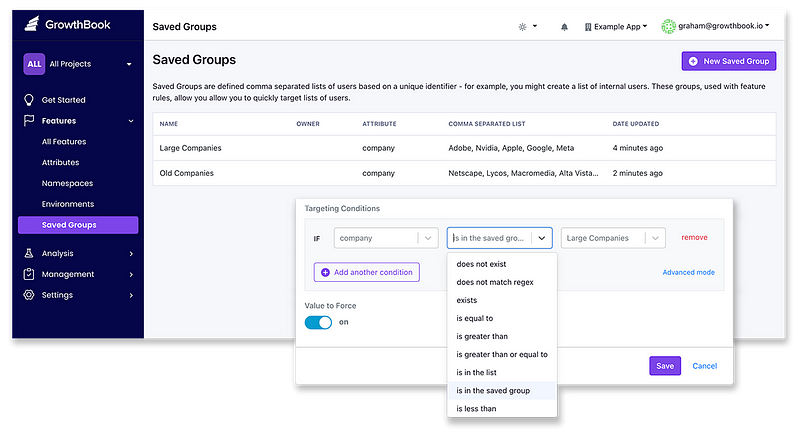One of our biggest releases yet! This version includes over 50 highly requested features and bug fixes. We are super excited to share the highlights of the release. As always, please let us know if you have any feedback.
🌙 Dark Mode
At GrowthBook, we always strive to build a great developer experience, and sometimes that means embracing the dark side. Our new Dark Mode is more friendly for the eyes, extends laptop battery life, and just plain looks cool. We’ll try to detect your OS preferences automatically, but you can switch themes at any time in the top nav bar.
➗ Ratio Metrics V2 with the Delta Method
Back in version 1.4, we added initial support for Ratio Metrics, but there was a big restriction — the randomization unit and analysis unit had to be the same. If you split traffic per user, all of your metrics had to also be per-user. That means you couldn’t do things like “Pages per Session” or “Average Order Value”, which instead of users are based on sessions and orders, respectively.
In this latest release, we lifted this restriction. You can now have metrics based on any unit — orders, sessions, page views, whatever you want. Behind the scenes, we use the Delta Method for variance correction to make sure our statistics engine can give you accurate results, no matter what units you pick.
🎯 Reusable Targeting Groups

One of our most requested changes is now live! Instead of copy/pasting lists of user ids between feature targeting conditions, you can now define that list once in a Saved Group and easily reference it from multiple places.
For example, you could make a Saved Group called “Enterprise Customer Ids” and use it to release all of your new enterprise features. If you later add or remove a customer from the group, it will automatically update all of the features. We have a lot planned for this section in the future, including the ability to populate groups from a SQL query, so stay tuned!
Different Attribution Models

The attribution model is how GrowthBook decides which metric conversions to include in an experiment analysis. Until now, we always used a “First Exposure” model, where only a user’s first time viewing the experiment is considered. If they came back and viewed the experiment again a week later, we ignored it.
With this release, you can now choose to use an “All Exposures” attribution model instead, in which these subsequent experiment views are also considered. Depending on the experiment, this can dramatically reduce the amount of time needed to reach significance, so we highly recommend trying it out to see if it makes sense for your use case. If we get enough positive feedback, we may decide to make this the new default model in the future, so let us know your thoughts!
Self-hosted Enterprise SSO

We overhauled our authentication system to support Enterprise SSO, no matter where GrowthBook is deployed — whether it’s on our managed GrowthBook Cloud or in your own infrastructure. Reach out to sales@growthbook.io if you’d like to learn more about our Enterprise offerings.
Microsoft SQL Server Support

We added Microsoft SQL Server as an officially supported data source. Our goal at GrowthBook is to let you experiment on top of your existing data infrastructure, no matter where it lives. This brings us one step closer to that vision. Let us know what other data sources you’d like to see us add next!
Other Features and Improvements
- Support for Snowflake authenticated proxies when self-hosting
- Add documentation and examples for Swift and C# SDK
- Invite multiple team members at once
- Added SSL support for MySQL and Trino/Presto data sources
- Validate SQL and feature values before saving
- Added experimentId as a SQL template variable
- Allow OR in Mixpanel metric event names to match against multiple events
And many more changes and bug fixes which you can read about here: https://github.com/growthbook/growthbook/releases






